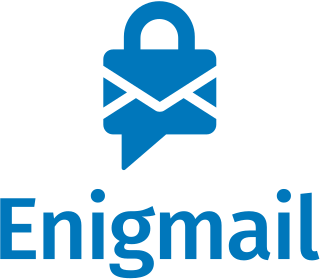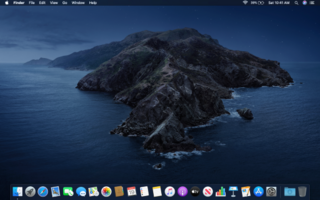Pretty Good Privacy (PGP) is an encryption program that provides cryptographic privacy and authentication for data communication. PGP is used for signing, encrypting, and decrypting texts, e-mails, files, directories, and whole disk partitions and to increase the security of e-mail communications. Phil Zimmermann developed PGP in 1991.

GNU Privacy Guard is a free-software replacement for Symantec's PGP cryptographic software suite. The software is compliant with RFC 4880, the IETF standards-track specification of OpenPGP. Modern versions of PGP are interoperable with GnuPG and other OpenPGP-compliant systems.

macOS Server, formerly Mac OS X Server and OS X Server, is a series of Unix-like server operating systems developed by Apple Inc., based on macOS and later add-on software packages for the latter. macOS Server adds server functionality and system administration tools to macOS and provides tools to manage both macOS-based computers and iOS-based devices.

GNOME Evolution is the official personal information manager for GNOME. It has been an official part of GNOME since Evolution 2.0 was included with the GNOME 2.8 release in September 2004. It combines e-mail, address book, calendar, task list and note-taking features. Its user interface and functionality is similar to Microsoft Outlook. Evolution is free software licensed under the terms of the GNU Lesser General Public License (LGPL).
Transport Layer Security (TLS), the successor of the now-deprecated Secure Sockets Layer (SSL), is a cryptographic protocol designed to provide communications security over a computer network. The protocol is widely used in applications such as email, instant messaging, and voice over IP, but its use in securing HTTPS remains the most publicly visible.

Apple Mail is an email client included by Apple Inc. with its operating systems macOS, iOS, iPadOS and watchOS. Apple Mail grew out of NeXTMail, which was originally developed by NeXT as part of its NeXTSTEP operating system, after Apple's acquisition of NeXT in 1997.

Enigmail is a data encryption and decryption extension for Mozilla Thunderbird and the Postbox that provides OpenPGP public key e-mail encryption and signing. Enigmail works under Microsoft Windows, Unix-like, and Mac OS X operating systems. Enigmail can operate with other mail clients compatible with PGP/MIME and inline PGP such as: Microsoft Outlook with Gpg4win package installed, Gnome Evolution, KMail, Claws Mail, Gnus, Mutt. Its cryptographic functionality is handled by GNU Privacy Guard.
S/MIME is a standard for public key encryption and signing of MIME data. S/MIME is on an IETF standards track and defined in a number of documents, most importantly RFC 3369, 3370, 3850 and 3851. It was originally developed by RSA Data Security and the original specification used the IETF MIME specification with the de facto industry standard PKCS#7 secure message format. Change control to S/MIME has since been vested in the IETF and the specification is now layered on Cryptographic Message Syntax (CMS), an IETF specification that is identical in most respects with PKCS #7. S/MIME functionality is built into the majority of modern email software and interoperates between them. Since it is built on CMS, MIME can also hold an advanced digital signature.
In computer security, a key server is a computer that receives and then serves existing cryptographic keys to users or other programs. The users' programs can be running on the same network as the key server or on another networked computer.
The following tables compare general and technical features of notable email client programs.

WinPT or Windows Privacy Tray is frontend to the Gnu Privacy Guard (GnuPG) for the Windows platform. Released under GPL, it is compatible with OpenPGP compliant software.
Email encryption is encryption of email messages to protect the content from being read by entities other than the intended recipients. Email encryption may also include authentication.
Gpg4win is an email and file encryption package for most versions of Microsoft Windows and Microsoft Outlook, which utilises the GnuPG framework for symmetric and public-key cryptography, such as data encryption, digital signatures, hash calculations etc.
The Transport Layer Security (TLS) protocol provides the ability to secure communications across networks. This comparison of TLS implementations compares several of the most notable libraries. There are several TLS implementations which are free software and open source.

ProtonMail is an end-to-end encrypted email service founded in 2013 in Geneva, Switzerland. ProtonMail uses client-side encryption to protect email content and user data before they are sent to ProtonMail servers, unlike other common email providers such as Gmail and Outlook.com. The service can be accessed through a webmail client, the Tor network, or dedicated iOS and Android apps.

pretty Easy privacy is a pluggable data encryption and verification system, which provides automatic cryptographic key management through a set of libraries for written digital communications. Its main goal is to turn the default in written digital communications towards end-to-end encryption for all users in the easiest way possible and on all channels they use already today, including e-mails, SMS, or other types of messages.
Apple File System (APFS) is a proprietary file system developed and deployed by Apple Inc. for macOS Sierra (10.12.4) and later, iOS 10.3 and later, tvOS 10.2 and later, watchOS 3.2 and later, and all versions of iPadOS. It aims to fix core problems of HFS+, APFS's predecessor on these operating systems. APFS is optimized for solid-state drive storage and supports encryption, snapshots, and increased data integrity, among other capabilities.

macOS Mojave is the fifteenth major release of macOS, Apple Inc.'s desktop operating system for Macintosh computers. Mojave was announced at Apple's Worldwide Developers Conference on June 4, 2018, and was released to the public on September 24, 2018. The operating system's name refers to the Mojave Desert and is part of a series of California-themed names that began with OS X Mavericks. It succeeded macOS High Sierra and was followed by macOS Catalina.

macOS Catalina is the sixteenth major release of macOS, Apple Inc.'s desktop operating system for Macintosh computers. It is the successor to macOS Mojave and was announced at WWDC 2019 on June 3, 2019 and released to the public on October 7, 2019. Catalina is the first version of macOS to support only 64-bit applications and the first to include Activation Lock. It is also the last version of macOS to have the major version number of 10; its successor, Big Sur, released on November 12, 2020, is version 11. In order to increase web compatibility, Safari, Chromium and Firefox have frozen the OS in the user agent running in subsequent releases of macOS at 10.15.7 Catalina.

macOS Big Sur is the seventeenth major release of macOS, Apple Inc.'s operating system for Macintosh computers. It was announced at Apple's Worldwide Developers Conference (WWDC) on June 22, 2020, and was released to the public on November 12, 2020.











